MDT THA 2
VerifiedAdded on 2023/06/09
|10
|2961
|112
AI Summary
This report covers the issues faced by the Maltese healthcare practices in their workplace. It discusses the positive and negative aspects related to the Multidisciplinary team, difference between group and team, group dynamics, Reserved Acts according to Maltese Nursing Scope of Practice, and personal strengths, weaknesses, opportunities and threats that will aid/hinder to work in an MDT in Malta.
Contribute Materials
Your contribution can guide someone’s learning journey. Share your
documents today.
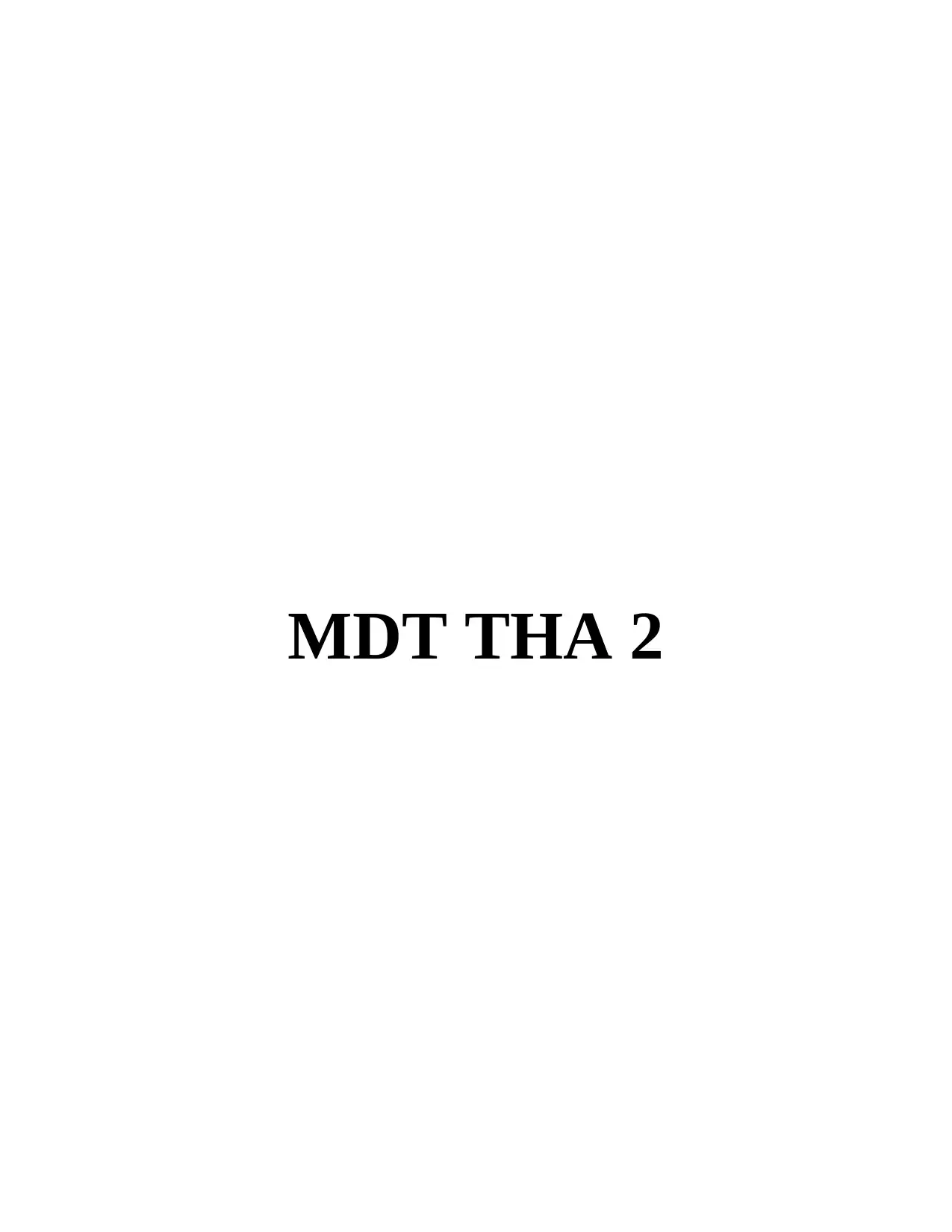
MDT THA 2
Secure Best Marks with AI Grader
Need help grading? Try our AI Grader for instant feedback on your assignments.
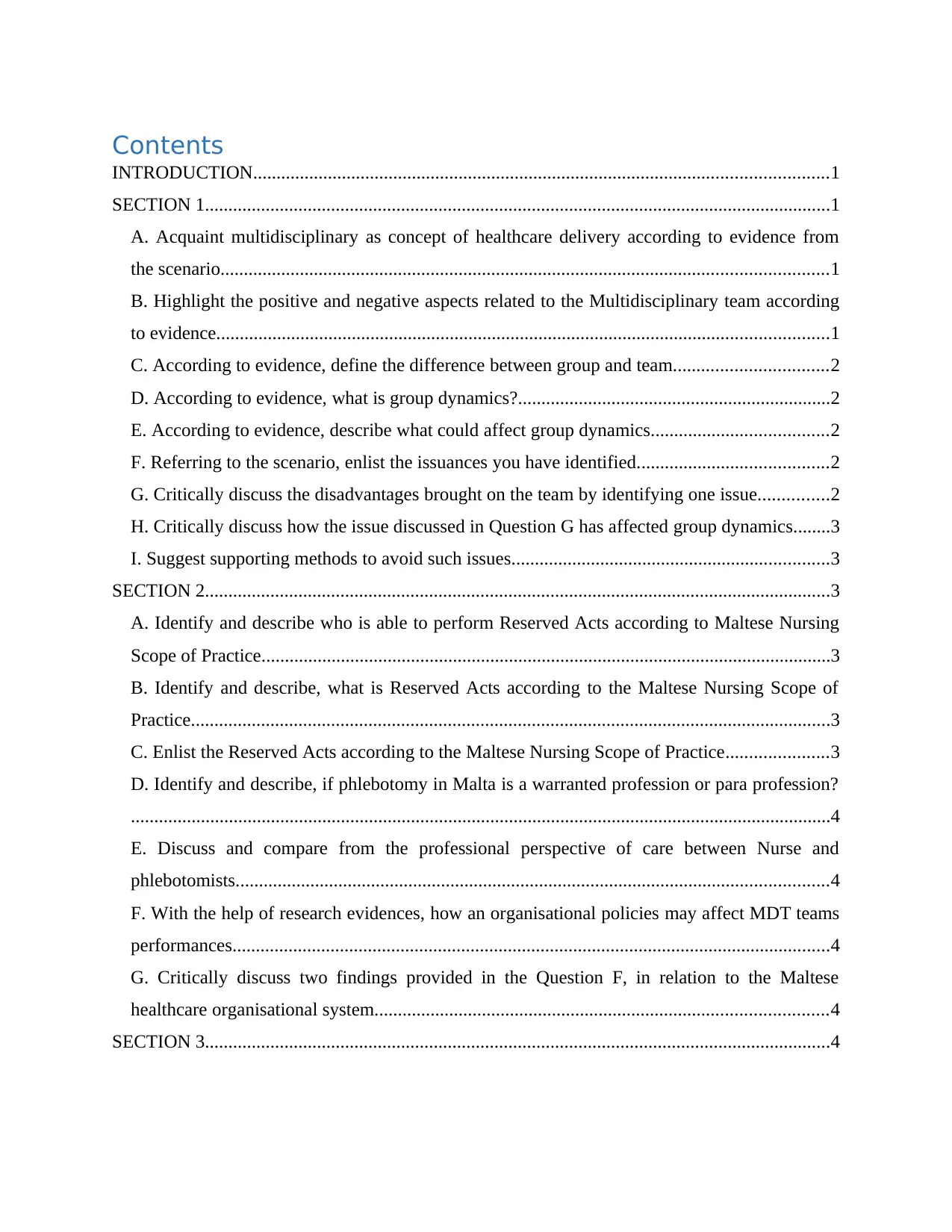
Contents
INTRODUCTION...........................................................................................................................1
SECTION 1......................................................................................................................................1
A. Acquaint multidisciplinary as concept of healthcare delivery according to evidence from
the scenario..................................................................................................................................1
B. Highlight the positive and negative aspects related to the Multidisciplinary team according
to evidence...................................................................................................................................1
C. According to evidence, define the difference between group and team.................................2
D. According to evidence, what is group dynamics?...................................................................2
E. According to evidence, describe what could affect group dynamics......................................2
F. Referring to the scenario, enlist the issuances you have identified.........................................2
G. Critically discuss the disadvantages brought on the team by identifying one issue...............2
H. Critically discuss how the issue discussed in Question G has affected group dynamics........3
I. Suggest supporting methods to avoid such issues....................................................................3
SECTION 2......................................................................................................................................3
A. Identify and describe who is able to perform Reserved Acts according to Maltese Nursing
Scope of Practice..........................................................................................................................3
B. Identify and describe, what is Reserved Acts according to the Maltese Nursing Scope of
Practice.........................................................................................................................................3
C. Enlist the Reserved Acts according to the Maltese Nursing Scope of Practice......................3
D. Identify and describe, if phlebotomy in Malta is a warranted profession or para profession?
......................................................................................................................................................4
E. Discuss and compare from the professional perspective of care between Nurse and
phlebotomists...............................................................................................................................4
F. With the help of research evidences, how an organisational policies may affect MDT teams
performances................................................................................................................................4
G. Critically discuss two findings provided in the Question F, in relation to the Maltese
healthcare organisational system.................................................................................................4
SECTION 3......................................................................................................................................4
INTRODUCTION...........................................................................................................................1
SECTION 1......................................................................................................................................1
A. Acquaint multidisciplinary as concept of healthcare delivery according to evidence from
the scenario..................................................................................................................................1
B. Highlight the positive and negative aspects related to the Multidisciplinary team according
to evidence...................................................................................................................................1
C. According to evidence, define the difference between group and team.................................2
D. According to evidence, what is group dynamics?...................................................................2
E. According to evidence, describe what could affect group dynamics......................................2
F. Referring to the scenario, enlist the issuances you have identified.........................................2
G. Critically discuss the disadvantages brought on the team by identifying one issue...............2
H. Critically discuss how the issue discussed in Question G has affected group dynamics........3
I. Suggest supporting methods to avoid such issues....................................................................3
SECTION 2......................................................................................................................................3
A. Identify and describe who is able to perform Reserved Acts according to Maltese Nursing
Scope of Practice..........................................................................................................................3
B. Identify and describe, what is Reserved Acts according to the Maltese Nursing Scope of
Practice.........................................................................................................................................3
C. Enlist the Reserved Acts according to the Maltese Nursing Scope of Practice......................3
D. Identify and describe, if phlebotomy in Malta is a warranted profession or para profession?
......................................................................................................................................................4
E. Discuss and compare from the professional perspective of care between Nurse and
phlebotomists...............................................................................................................................4
F. With the help of research evidences, how an organisational policies may affect MDT teams
performances................................................................................................................................4
G. Critically discuss two findings provided in the Question F, in relation to the Maltese
healthcare organisational system.................................................................................................4
SECTION 3......................................................................................................................................4
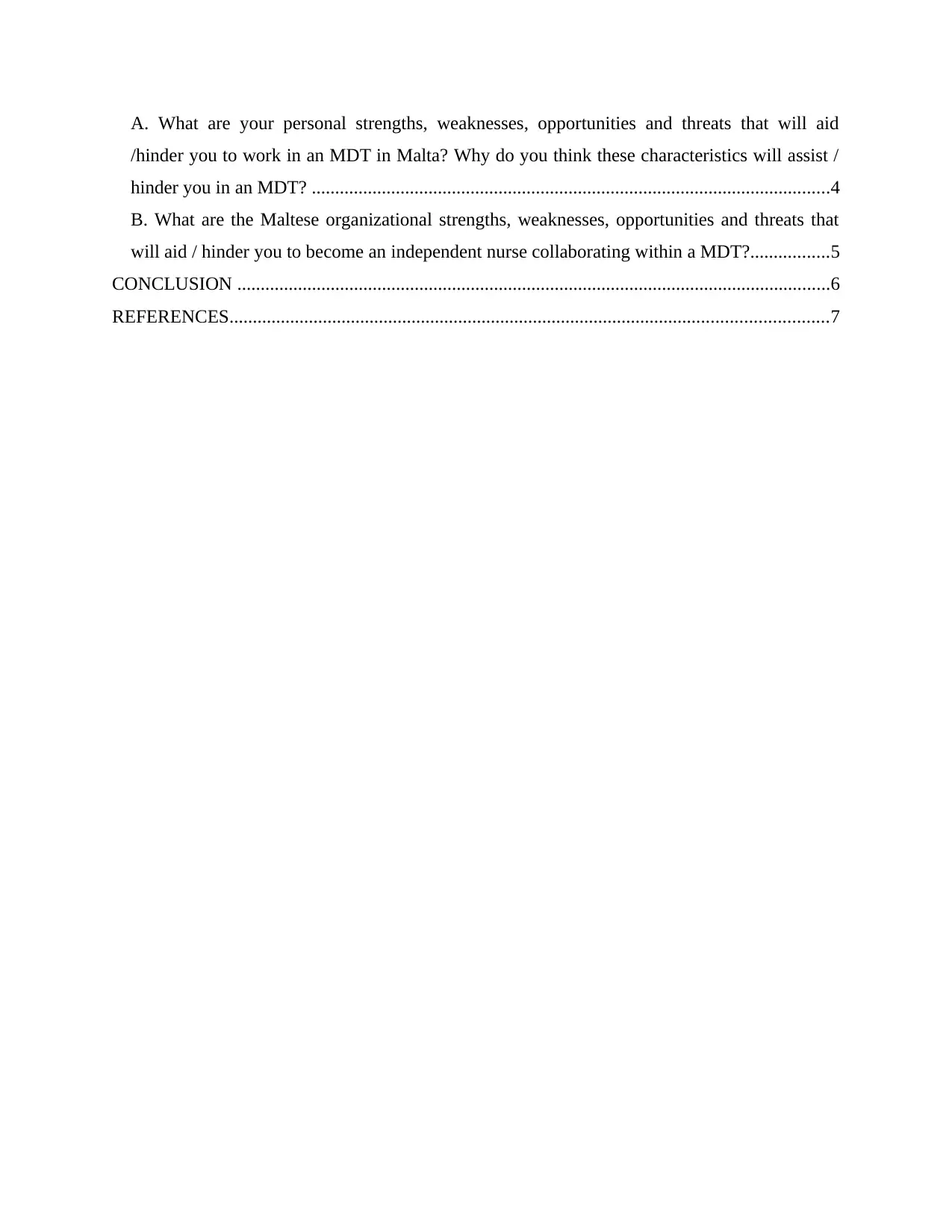
A. What are your personal strengths, weaknesses, opportunities and threats that will aid
/hinder you to work in an MDT in Malta? Why do you think these characteristics will assist /
hinder you in an MDT? ...............................................................................................................4
B. What are the Maltese organizational strengths, weaknesses, opportunities and threats that
will aid / hinder you to become an independent nurse collaborating within a MDT?.................5
CONCLUSION ...............................................................................................................................6
REFERENCES................................................................................................................................7
/hinder you to work in an MDT in Malta? Why do you think these characteristics will assist /
hinder you in an MDT? ...............................................................................................................4
B. What are the Maltese organizational strengths, weaknesses, opportunities and threats that
will aid / hinder you to become an independent nurse collaborating within a MDT?.................5
CONCLUSION ...............................................................................................................................6
REFERENCES................................................................................................................................7
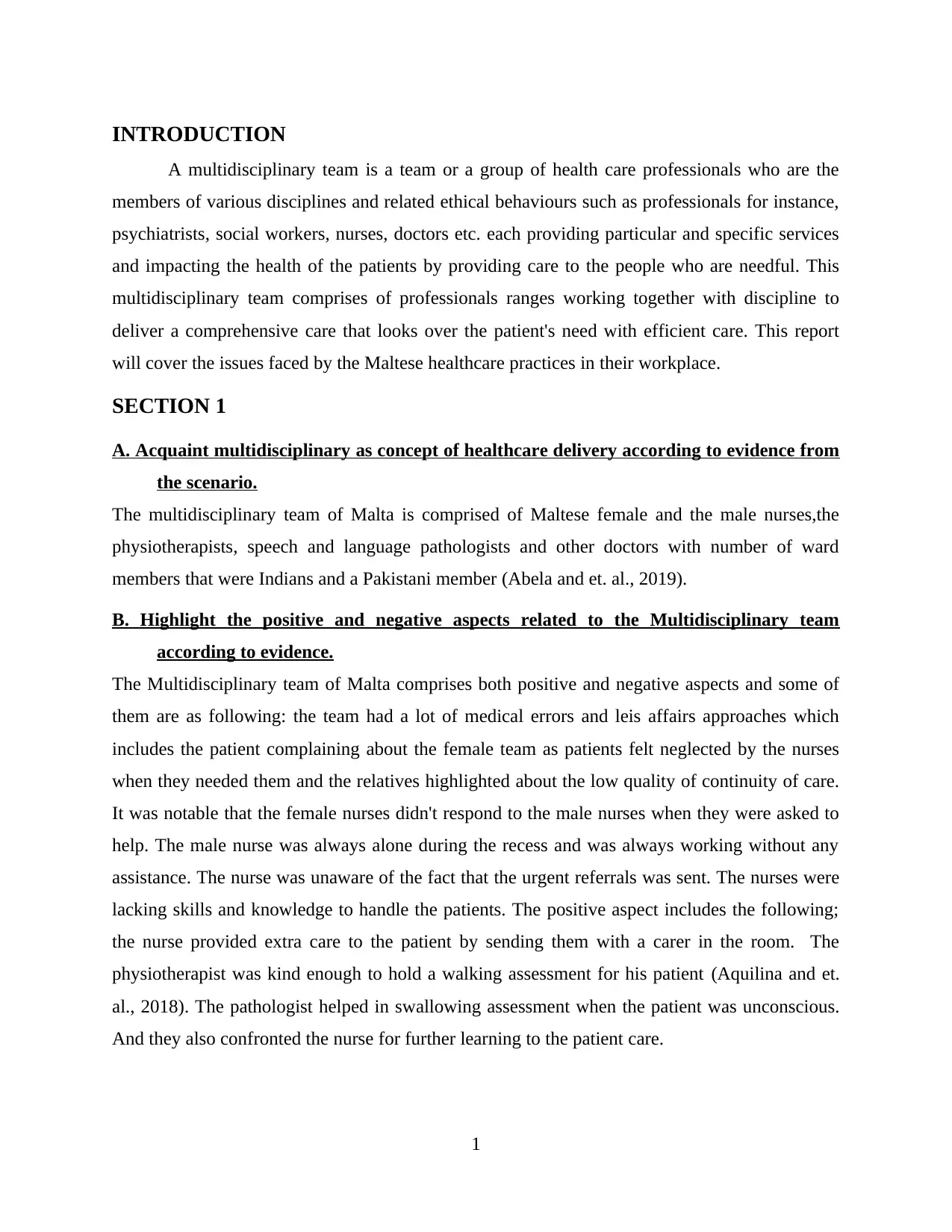
INTRODUCTION
A multidisciplinary team is a team or a group of health care professionals who are the
members of various disciplines and related ethical behaviours such as professionals for instance,
psychiatrists, social workers, nurses, doctors etc. each providing particular and specific services
and impacting the health of the patients by providing care to the people who are needful. This
multidisciplinary team comprises of professionals ranges working together with discipline to
deliver a comprehensive care that looks over the patient's need with efficient care. This report
will cover the issues faced by the Maltese healthcare practices in their workplace.
SECTION 1
A. Acquaint multidisciplinary as concept of healthcare delivery according to evidence from
the scenario.
The multidisciplinary team of Malta is comprised of Maltese female and the male nurses,the
physiotherapists, speech and language pathologists and other doctors with number of ward
members that were Indians and a Pakistani member (Abela and et. al., 2019).
B. Highlight the positive and negative aspects related to the Multidisciplinary team
according to evidence.
The Multidisciplinary team of Malta comprises both positive and negative aspects and some of
them are as following: the team had a lot of medical errors and leis affairs approaches which
includes the patient complaining about the female team as patients felt neglected by the nurses
when they needed them and the relatives highlighted about the low quality of continuity of care.
It was notable that the female nurses didn't respond to the male nurses when they were asked to
help. The male nurse was always alone during the recess and was always working without any
assistance. The nurse was unaware of the fact that the urgent referrals was sent. The nurses were
lacking skills and knowledge to handle the patients. The positive aspect includes the following;
the nurse provided extra care to the patient by sending them with a carer in the room. The
physiotherapist was kind enough to hold a walking assessment for his patient (Aquilina and et.
al., 2018). The pathologist helped in swallowing assessment when the patient was unconscious.
And they also confronted the nurse for further learning to the patient care.
1
A multidisciplinary team is a team or a group of health care professionals who are the
members of various disciplines and related ethical behaviours such as professionals for instance,
psychiatrists, social workers, nurses, doctors etc. each providing particular and specific services
and impacting the health of the patients by providing care to the people who are needful. This
multidisciplinary team comprises of professionals ranges working together with discipline to
deliver a comprehensive care that looks over the patient's need with efficient care. This report
will cover the issues faced by the Maltese healthcare practices in their workplace.
SECTION 1
A. Acquaint multidisciplinary as concept of healthcare delivery according to evidence from
the scenario.
The multidisciplinary team of Malta is comprised of Maltese female and the male nurses,the
physiotherapists, speech and language pathologists and other doctors with number of ward
members that were Indians and a Pakistani member (Abela and et. al., 2019).
B. Highlight the positive and negative aspects related to the Multidisciplinary team
according to evidence.
The Multidisciplinary team of Malta comprises both positive and negative aspects and some of
them are as following: the team had a lot of medical errors and leis affairs approaches which
includes the patient complaining about the female team as patients felt neglected by the nurses
when they needed them and the relatives highlighted about the low quality of continuity of care.
It was notable that the female nurses didn't respond to the male nurses when they were asked to
help. The male nurse was always alone during the recess and was always working without any
assistance. The nurse was unaware of the fact that the urgent referrals was sent. The nurses were
lacking skills and knowledge to handle the patients. The positive aspect includes the following;
the nurse provided extra care to the patient by sending them with a carer in the room. The
physiotherapist was kind enough to hold a walking assessment for his patient (Aquilina and et.
al., 2018). The pathologist helped in swallowing assessment when the patient was unconscious.
And they also confronted the nurse for further learning to the patient care.
1
Secure Best Marks with AI Grader
Need help grading? Try our AI Grader for instant feedback on your assignments.
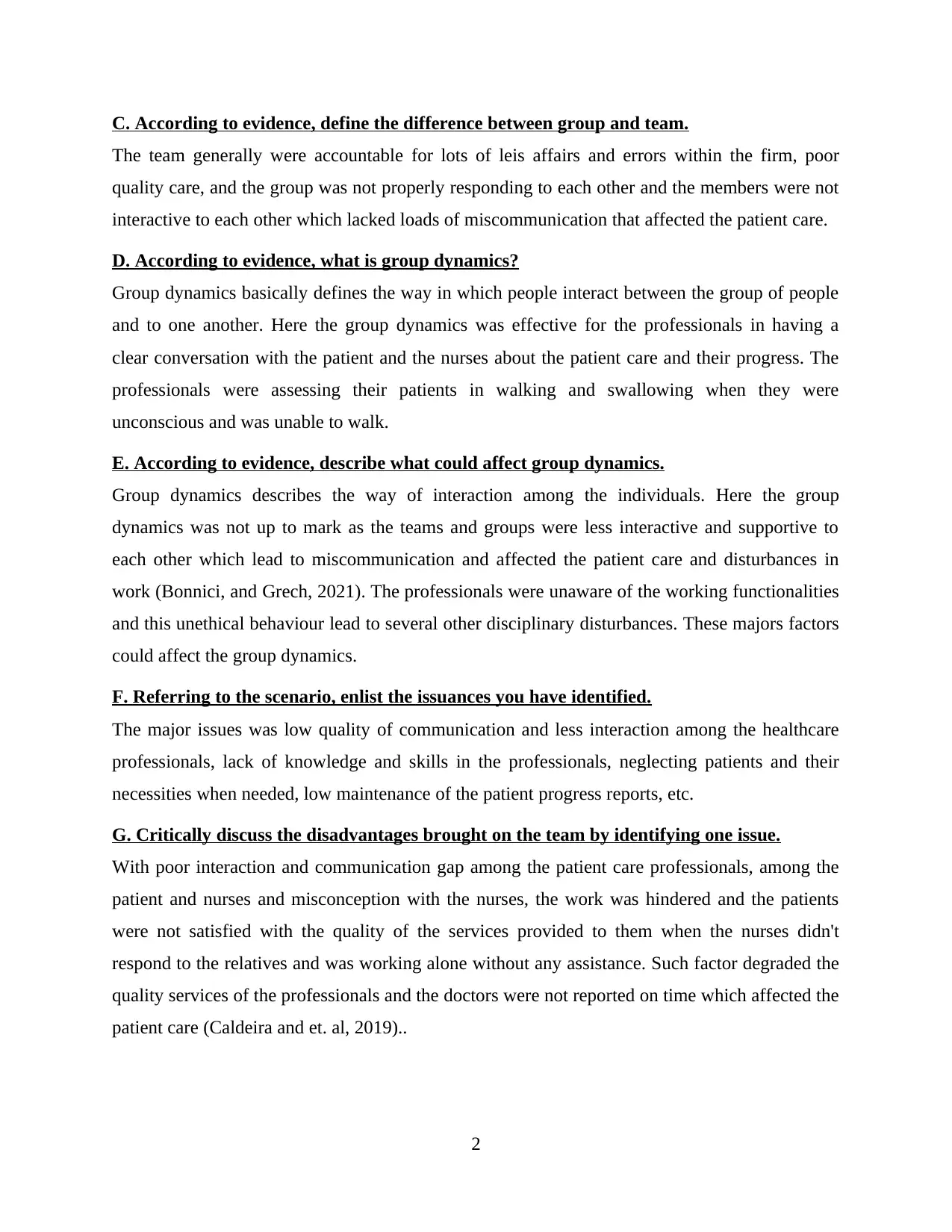
C. According to evidence, define the difference between group and team.
The team generally were accountable for lots of leis affairs and errors within the firm, poor
quality care, and the group was not properly responding to each other and the members were not
interactive to each other which lacked loads of miscommunication that affected the patient care.
D. According to evidence, what is group dynamics?
Group dynamics basically defines the way in which people interact between the group of people
and to one another. Here the group dynamics was effective for the professionals in having a
clear conversation with the patient and the nurses about the patient care and their progress. The
professionals were assessing their patients in walking and swallowing when they were
unconscious and was unable to walk.
E. According to evidence, describe what could affect group dynamics.
Group dynamics describes the way of interaction among the individuals. Here the group
dynamics was not up to mark as the teams and groups were less interactive and supportive to
each other which lead to miscommunication and affected the patient care and disturbances in
work (Bonnici, and Grech, 2021). The professionals were unaware of the working functionalities
and this unethical behaviour lead to several other disciplinary disturbances. These majors factors
could affect the group dynamics.
F. Referring to the scenario, enlist the issuances you have identified.
The major issues was low quality of communication and less interaction among the healthcare
professionals, lack of knowledge and skills in the professionals, neglecting patients and their
necessities when needed, low maintenance of the patient progress reports, etc.
G. Critically discuss the disadvantages brought on the team by identifying one issue.
With poor interaction and communication gap among the patient care professionals, among the
patient and nurses and misconception with the nurses, the work was hindered and the patients
were not satisfied with the quality of the services provided to them when the nurses didn't
respond to the relatives and was working alone without any assistance. Such factor degraded the
quality services of the professionals and the doctors were not reported on time which affected the
patient care (Caldeira and et. al, 2019)..
2
The team generally were accountable for lots of leis affairs and errors within the firm, poor
quality care, and the group was not properly responding to each other and the members were not
interactive to each other which lacked loads of miscommunication that affected the patient care.
D. According to evidence, what is group dynamics?
Group dynamics basically defines the way in which people interact between the group of people
and to one another. Here the group dynamics was effective for the professionals in having a
clear conversation with the patient and the nurses about the patient care and their progress. The
professionals were assessing their patients in walking and swallowing when they were
unconscious and was unable to walk.
E. According to evidence, describe what could affect group dynamics.
Group dynamics describes the way of interaction among the individuals. Here the group
dynamics was not up to mark as the teams and groups were less interactive and supportive to
each other which lead to miscommunication and affected the patient care and disturbances in
work (Bonnici, and Grech, 2021). The professionals were unaware of the working functionalities
and this unethical behaviour lead to several other disciplinary disturbances. These majors factors
could affect the group dynamics.
F. Referring to the scenario, enlist the issuances you have identified.
The major issues was low quality of communication and less interaction among the healthcare
professionals, lack of knowledge and skills in the professionals, neglecting patients and their
necessities when needed, low maintenance of the patient progress reports, etc.
G. Critically discuss the disadvantages brought on the team by identifying one issue.
With poor interaction and communication gap among the patient care professionals, among the
patient and nurses and misconception with the nurses, the work was hindered and the patients
were not satisfied with the quality of the services provided to them when the nurses didn't
respond to the relatives and was working alone without any assistance. Such factor degraded the
quality services of the professionals and the doctors were not reported on time which affected the
patient care (Caldeira and et. al, 2019)..
2
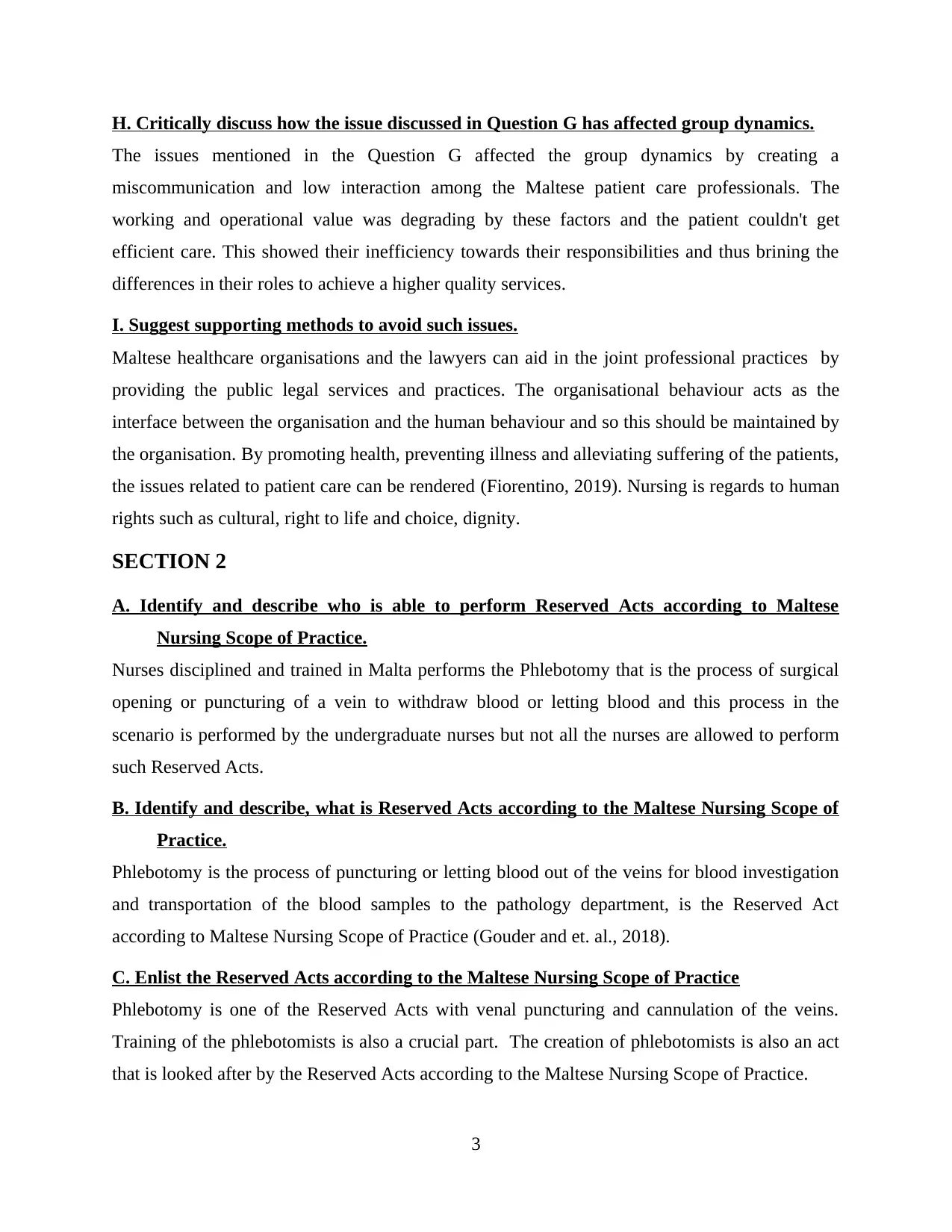
H. Critically discuss how the issue discussed in Question G has affected group dynamics.
The issues mentioned in the Question G affected the group dynamics by creating a
miscommunication and low interaction among the Maltese patient care professionals. The
working and operational value was degrading by these factors and the patient couldn't get
efficient care. This showed their inefficiency towards their responsibilities and thus brining the
differences in their roles to achieve a higher quality services.
I. Suggest supporting methods to avoid such issues.
Maltese healthcare organisations and the lawyers can aid in the joint professional practices by
providing the public legal services and practices. The organisational behaviour acts as the
interface between the organisation and the human behaviour and so this should be maintained by
the organisation. By promoting health, preventing illness and alleviating suffering of the patients,
the issues related to patient care can be rendered (Fiorentino, 2019). Nursing is regards to human
rights such as cultural, right to life and choice, dignity.
SECTION 2
A. Identify and describe who is able to perform Reserved Acts according to Maltese
Nursing Scope of Practice.
Nurses disciplined and trained in Malta performs the Phlebotomy that is the process of surgical
opening or puncturing of a vein to withdraw blood or letting blood and this process in the
scenario is performed by the undergraduate nurses but not all the nurses are allowed to perform
such Reserved Acts.
B. Identify and describe, what is Reserved Acts according to the Maltese Nursing Scope of
Practice.
Phlebotomy is the process of puncturing or letting blood out of the veins for blood investigation
and transportation of the blood samples to the pathology department, is the Reserved Act
according to Maltese Nursing Scope of Practice (Gouder and et. al., 2018).
C. Enlist the Reserved Acts according to the Maltese Nursing Scope of Practice
Phlebotomy is one of the Reserved Acts with venal puncturing and cannulation of the veins.
Training of the phlebotomists is also a crucial part. The creation of phlebotomists is also an act
that is looked after by the Reserved Acts according to the Maltese Nursing Scope of Practice.
3
The issues mentioned in the Question G affected the group dynamics by creating a
miscommunication and low interaction among the Maltese patient care professionals. The
working and operational value was degrading by these factors and the patient couldn't get
efficient care. This showed their inefficiency towards their responsibilities and thus brining the
differences in their roles to achieve a higher quality services.
I. Suggest supporting methods to avoid such issues.
Maltese healthcare organisations and the lawyers can aid in the joint professional practices by
providing the public legal services and practices. The organisational behaviour acts as the
interface between the organisation and the human behaviour and so this should be maintained by
the organisation. By promoting health, preventing illness and alleviating suffering of the patients,
the issues related to patient care can be rendered (Fiorentino, 2019). Nursing is regards to human
rights such as cultural, right to life and choice, dignity.
SECTION 2
A. Identify and describe who is able to perform Reserved Acts according to Maltese
Nursing Scope of Practice.
Nurses disciplined and trained in Malta performs the Phlebotomy that is the process of surgical
opening or puncturing of a vein to withdraw blood or letting blood and this process in the
scenario is performed by the undergraduate nurses but not all the nurses are allowed to perform
such Reserved Acts.
B. Identify and describe, what is Reserved Acts according to the Maltese Nursing Scope of
Practice.
Phlebotomy is the process of puncturing or letting blood out of the veins for blood investigation
and transportation of the blood samples to the pathology department, is the Reserved Act
according to Maltese Nursing Scope of Practice (Gouder and et. al., 2018).
C. Enlist the Reserved Acts according to the Maltese Nursing Scope of Practice
Phlebotomy is one of the Reserved Acts with venal puncturing and cannulation of the veins.
Training of the phlebotomists is also a crucial part. The creation of phlebotomists is also an act
that is looked after by the Reserved Acts according to the Maltese Nursing Scope of Practice.
3
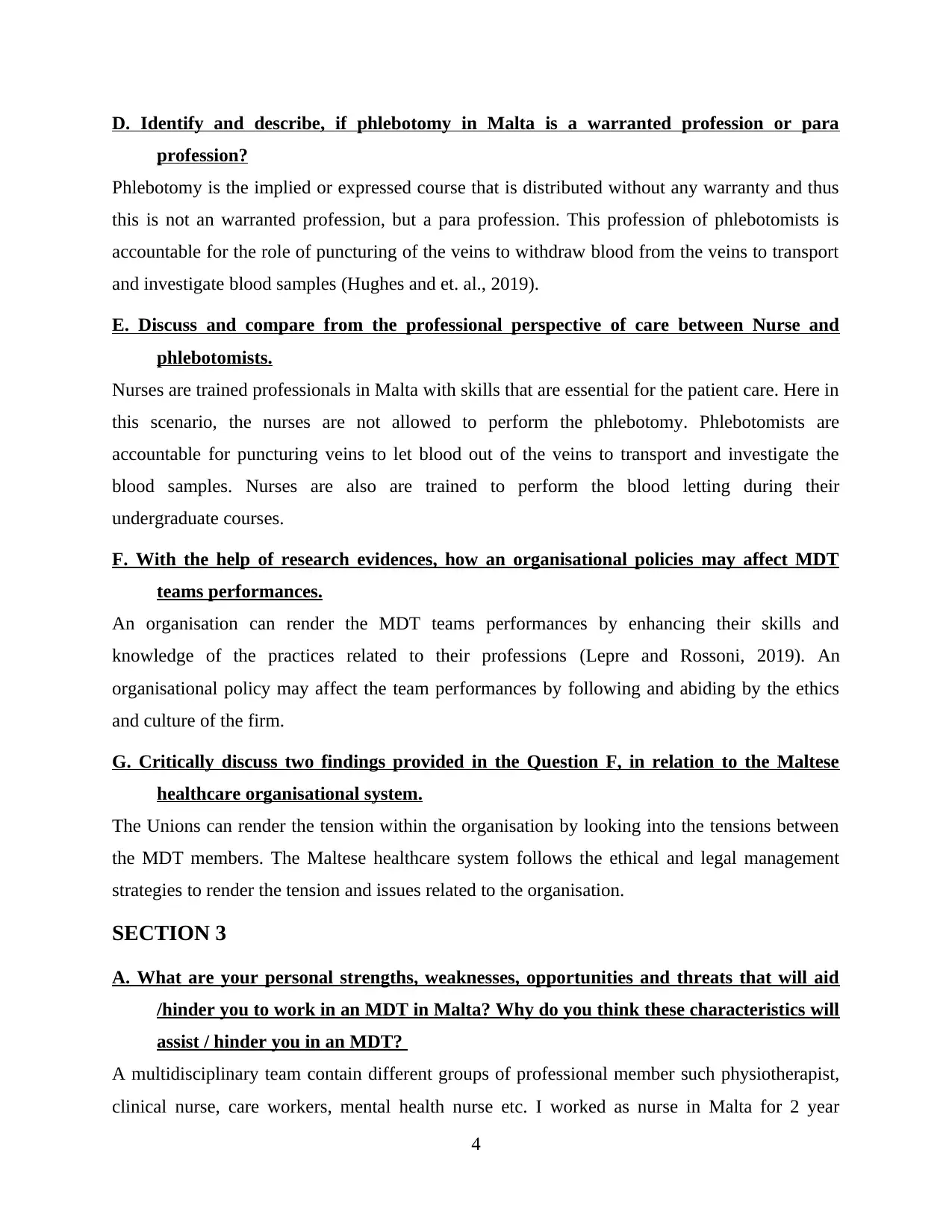
D. Identify and describe, if phlebotomy in Malta is a warranted profession or para
profession?
Phlebotomy is the implied or expressed course that is distributed without any warranty and thus
this is not an warranted profession, but a para profession. This profession of phlebotomists is
accountable for the role of puncturing of the veins to withdraw blood from the veins to transport
and investigate blood samples (Hughes and et. al., 2019).
E. Discuss and compare from the professional perspective of care between Nurse and
phlebotomists.
Nurses are trained professionals in Malta with skills that are essential for the patient care. Here in
this scenario, the nurses are not allowed to perform the phlebotomy. Phlebotomists are
accountable for puncturing veins to let blood out of the veins to transport and investigate the
blood samples. Nurses are also are trained to perform the blood letting during their
undergraduate courses.
F. With the help of research evidences, how an organisational policies may affect MDT
teams performances.
An organisation can render the MDT teams performances by enhancing their skills and
knowledge of the practices related to their professions (Lepre and Rossoni, 2019). An
organisational policy may affect the team performances by following and abiding by the ethics
and culture of the firm.
G. Critically discuss two findings provided in the Question F, in relation to the Maltese
healthcare organisational system.
The Unions can render the tension within the organisation by looking into the tensions between
the MDT members. The Maltese healthcare system follows the ethical and legal management
strategies to render the tension and issues related to the organisation.
SECTION 3
A. What are your personal strengths, weaknesses, opportunities and threats that will aid
/hinder you to work in an MDT in Malta? Why do you think these characteristics will
assist / hinder you in an MDT?
A multidisciplinary team contain different groups of professional member such physiotherapist,
clinical nurse, care workers, mental health nurse etc. I worked as nurse in Malta for 2 year
4
profession?
Phlebotomy is the implied or expressed course that is distributed without any warranty and thus
this is not an warranted profession, but a para profession. This profession of phlebotomists is
accountable for the role of puncturing of the veins to withdraw blood from the veins to transport
and investigate blood samples (Hughes and et. al., 2019).
E. Discuss and compare from the professional perspective of care between Nurse and
phlebotomists.
Nurses are trained professionals in Malta with skills that are essential for the patient care. Here in
this scenario, the nurses are not allowed to perform the phlebotomy. Phlebotomists are
accountable for puncturing veins to let blood out of the veins to transport and investigate the
blood samples. Nurses are also are trained to perform the blood letting during their
undergraduate courses.
F. With the help of research evidences, how an organisational policies may affect MDT
teams performances.
An organisation can render the MDT teams performances by enhancing their skills and
knowledge of the practices related to their professions (Lepre and Rossoni, 2019). An
organisational policy may affect the team performances by following and abiding by the ethics
and culture of the firm.
G. Critically discuss two findings provided in the Question F, in relation to the Maltese
healthcare organisational system.
The Unions can render the tension within the organisation by looking into the tensions between
the MDT members. The Maltese healthcare system follows the ethical and legal management
strategies to render the tension and issues related to the organisation.
SECTION 3
A. What are your personal strengths, weaknesses, opportunities and threats that will aid
/hinder you to work in an MDT in Malta? Why do you think these characteristics will
assist / hinder you in an MDT?
A multidisciplinary team contain different groups of professional member such physiotherapist,
clinical nurse, care workers, mental health nurse etc. I worked as nurse in Malta for 2 year
4
Paraphrase This Document
Need a fresh take? Get an instant paraphrase of this document with our AI Paraphraser
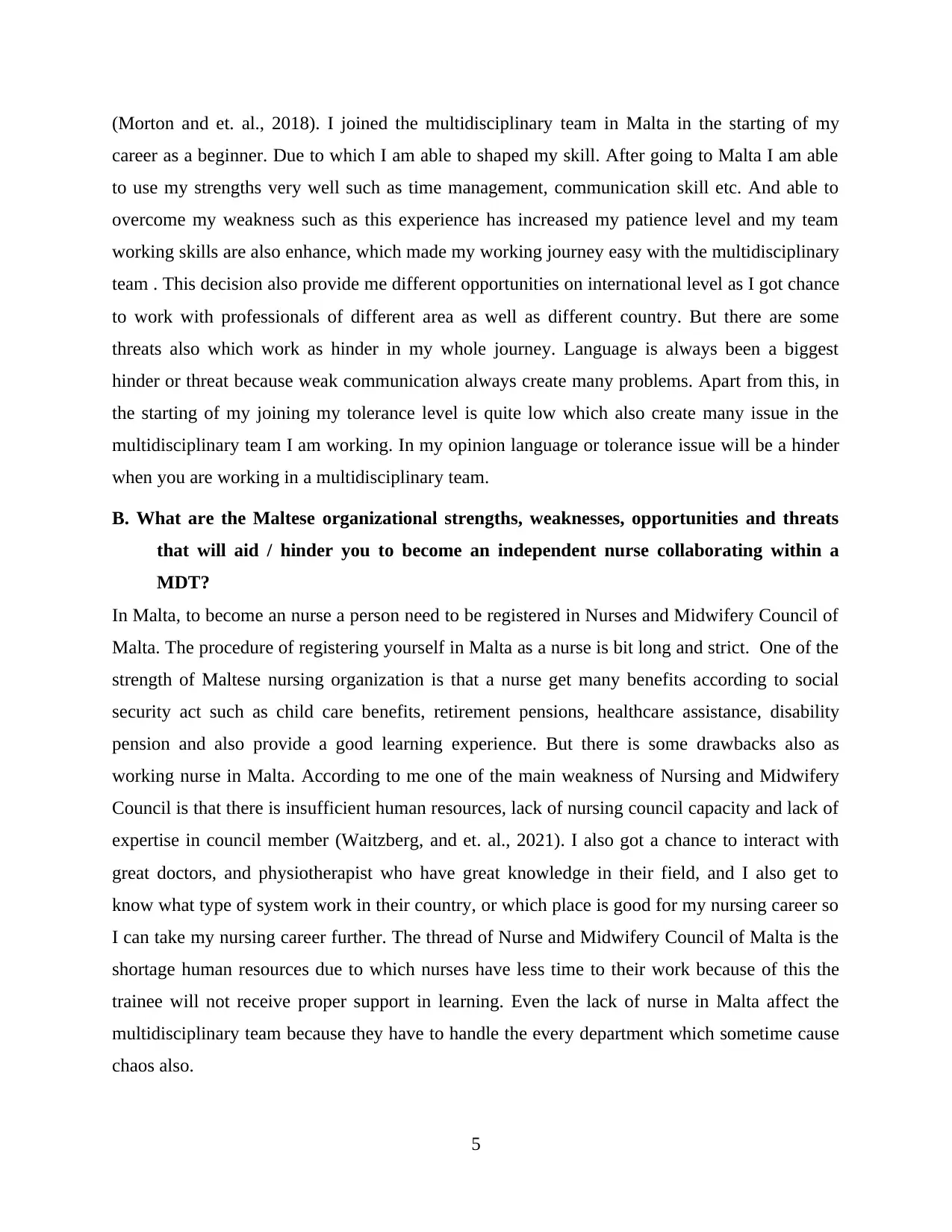
(Morton and et. al., 2018). I joined the multidisciplinary team in Malta in the starting of my
career as a beginner. Due to which I am able to shaped my skill. After going to Malta I am able
to use my strengths very well such as time management, communication skill etc. And able to
overcome my weakness such as this experience has increased my patience level and my team
working skills are also enhance, which made my working journey easy with the multidisciplinary
team . This decision also provide me different opportunities on international level as I got chance
to work with professionals of different area as well as different country. But there are some
threats also which work as hinder in my whole journey. Language is always been a biggest
hinder or threat because weak communication always create many problems. Apart from this, in
the starting of my joining my tolerance level is quite low which also create many issue in the
multidisciplinary team I am working. In my opinion language or tolerance issue will be a hinder
when you are working in a multidisciplinary team.
B. What are the Maltese organizational strengths, weaknesses, opportunities and threats
that will aid / hinder you to become an independent nurse collaborating within a
MDT?
In Malta, to become an nurse a person need to be registered in Nurses and Midwifery Council of
Malta. The procedure of registering yourself in Malta as a nurse is bit long and strict. One of the
strength of Maltese nursing organization is that a nurse get many benefits according to social
security act such as child care benefits, retirement pensions, healthcare assistance, disability
pension and also provide a good learning experience. But there is some drawbacks also as
working nurse in Malta. According to me one of the main weakness of Nursing and Midwifery
Council is that there is insufficient human resources, lack of nursing council capacity and lack of
expertise in council member (Waitzberg, and et. al., 2021). I also got a chance to interact with
great doctors, and physiotherapist who have great knowledge in their field, and I also get to
know what type of system work in their country, or which place is good for my nursing career so
I can take my nursing career further. The thread of Nurse and Midwifery Council of Malta is the
shortage human resources due to which nurses have less time to their work because of this the
trainee will not receive proper support in learning. Even the lack of nurse in Malta affect the
multidisciplinary team because they have to handle the every department which sometime cause
chaos also.
5
career as a beginner. Due to which I am able to shaped my skill. After going to Malta I am able
to use my strengths very well such as time management, communication skill etc. And able to
overcome my weakness such as this experience has increased my patience level and my team
working skills are also enhance, which made my working journey easy with the multidisciplinary
team . This decision also provide me different opportunities on international level as I got chance
to work with professionals of different area as well as different country. But there are some
threats also which work as hinder in my whole journey. Language is always been a biggest
hinder or threat because weak communication always create many problems. Apart from this, in
the starting of my joining my tolerance level is quite low which also create many issue in the
multidisciplinary team I am working. In my opinion language or tolerance issue will be a hinder
when you are working in a multidisciplinary team.
B. What are the Maltese organizational strengths, weaknesses, opportunities and threats
that will aid / hinder you to become an independent nurse collaborating within a
MDT?
In Malta, to become an nurse a person need to be registered in Nurses and Midwifery Council of
Malta. The procedure of registering yourself in Malta as a nurse is bit long and strict. One of the
strength of Maltese nursing organization is that a nurse get many benefits according to social
security act such as child care benefits, retirement pensions, healthcare assistance, disability
pension and also provide a good learning experience. But there is some drawbacks also as
working nurse in Malta. According to me one of the main weakness of Nursing and Midwifery
Council is that there is insufficient human resources, lack of nursing council capacity and lack of
expertise in council member (Waitzberg, and et. al., 2021). I also got a chance to interact with
great doctors, and physiotherapist who have great knowledge in their field, and I also get to
know what type of system work in their country, or which place is good for my nursing career so
I can take my nursing career further. The thread of Nurse and Midwifery Council of Malta is the
shortage human resources due to which nurses have less time to their work because of this the
trainee will not receive proper support in learning. Even the lack of nurse in Malta affect the
multidisciplinary team because they have to handle the every department which sometime cause
chaos also.
5
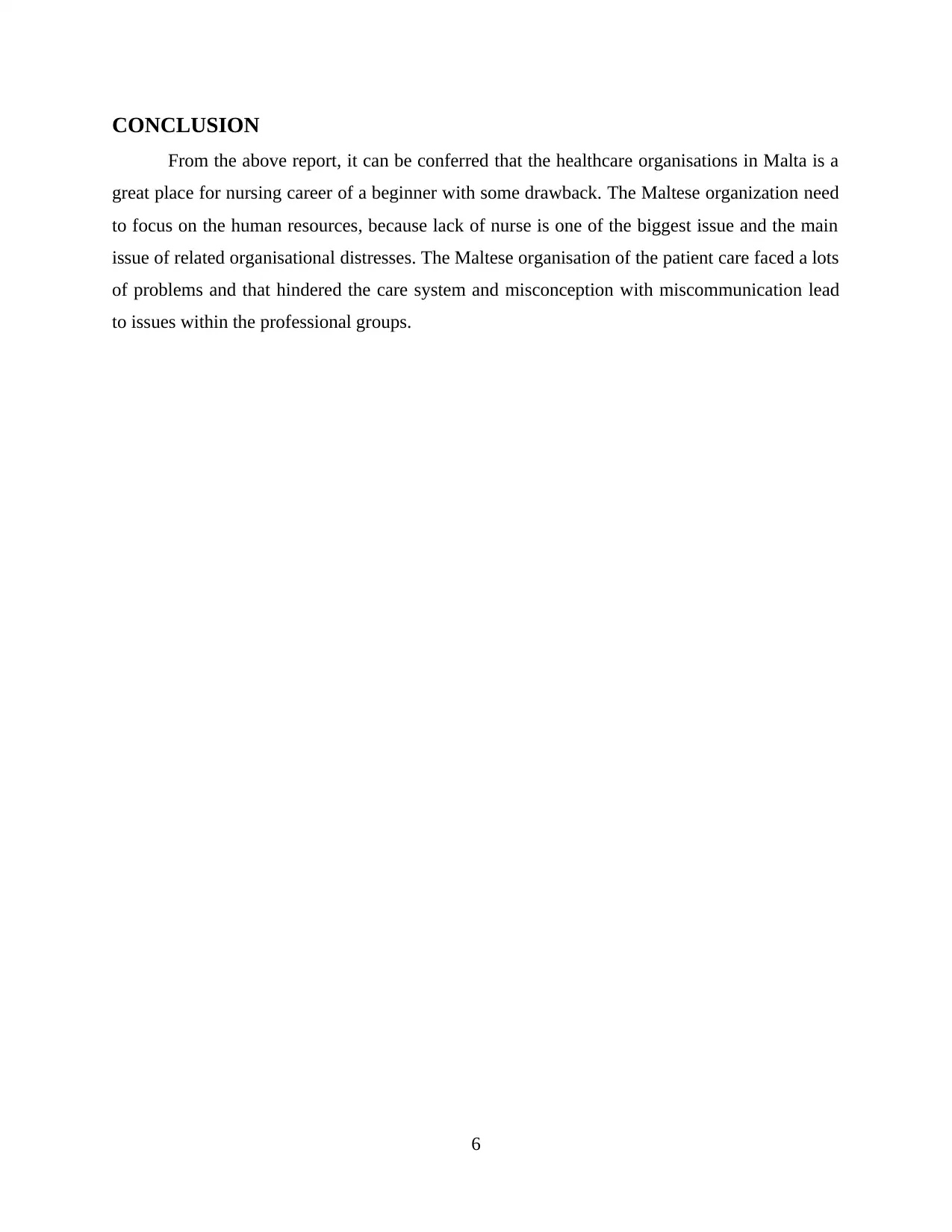
CONCLUSION
From the above report, it can be conferred that the healthcare organisations in Malta is a
great place for nursing career of a beginner with some drawback. The Maltese organization need
to focus on the human resources, because lack of nurse is one of the biggest issue and the main
issue of related organisational distresses. The Maltese organisation of the patient care faced a lots
of problems and that hindered the care system and misconception with miscommunication lead
to issues within the professional groups.
6
From the above report, it can be conferred that the healthcare organisations in Malta is a
great place for nursing career of a beginner with some drawback. The Maltese organization need
to focus on the human resources, because lack of nurse is one of the biggest issue and the main
issue of related organisational distresses. The Maltese organisation of the patient care faced a lots
of problems and that hindered the care system and misconception with miscommunication lead
to issues within the professional groups.
6
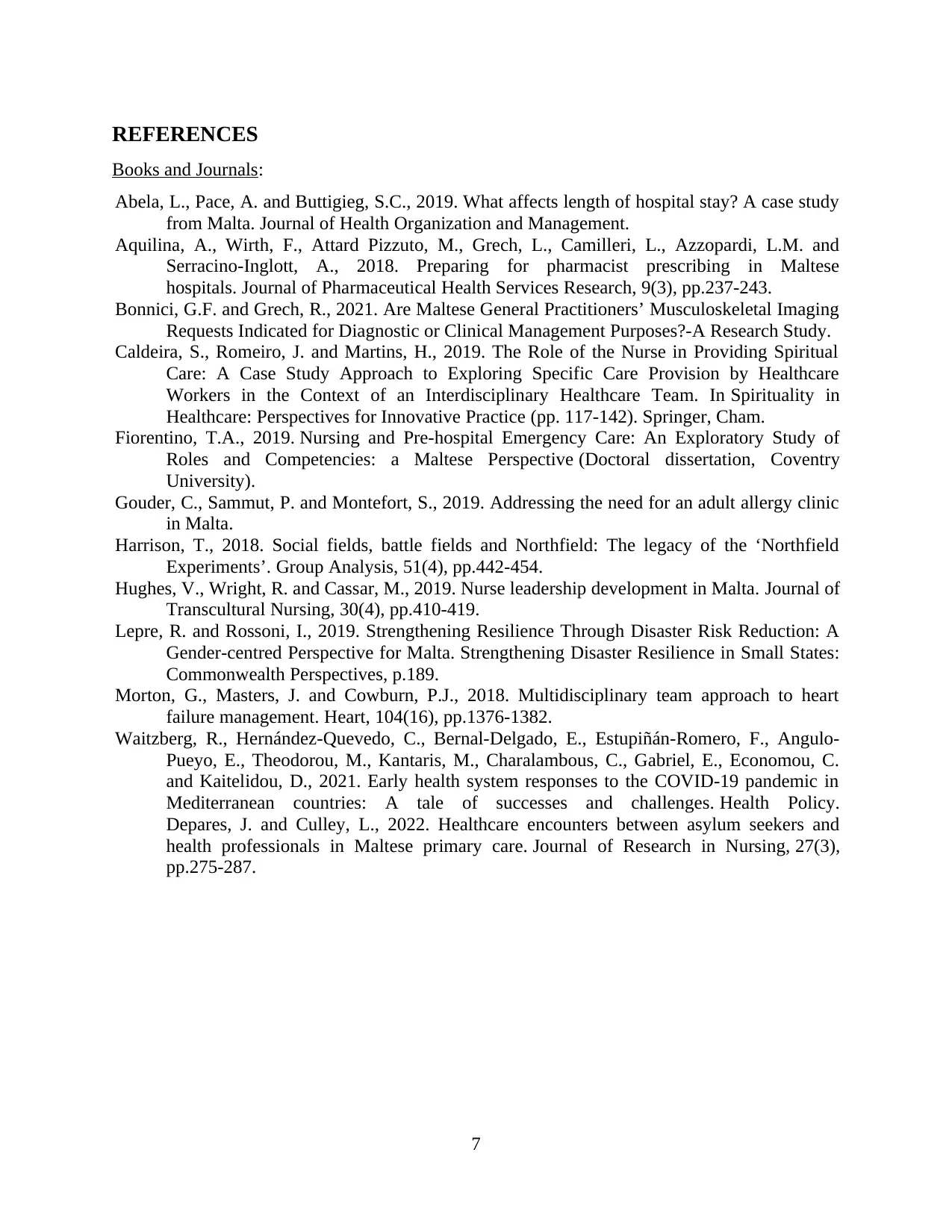
REFERENCES
Books and Journals:
Abela, L., Pace, A. and Buttigieg, S.C., 2019. What affects length of hospital stay? A case study
from Malta. Journal of Health Organization and Management.
Aquilina, A., Wirth, F., Attard Pizzuto, M., Grech, L., Camilleri, L., Azzopardi, L.M. and
Serracino-Inglott, A., 2018. Preparing for pharmacist prescribing in Maltese
hospitals. Journal of Pharmaceutical Health Services Research, 9(3), pp.237-243.
Bonnici, G.F. and Grech, R., 2021. Are Maltese General Practitioners’ Musculoskeletal Imaging
Requests Indicated for Diagnostic or Clinical Management Purposes?-A Research Study.
Caldeira, S., Romeiro, J. and Martins, H., 2019. The Role of the Nurse in Providing Spiritual
Care: A Case Study Approach to Exploring Specific Care Provision by Healthcare
Workers in the Context of an Interdisciplinary Healthcare Team. In Spirituality in
Healthcare: Perspectives for Innovative Practice (pp. 117-142). Springer, Cham.
Fiorentino, T.A., 2019. Nursing and Pre-hospital Emergency Care: An Exploratory Study of
Roles and Competencies: a Maltese Perspective (Doctoral dissertation, Coventry
University).
Gouder, C., Sammut, P. and Montefort, S., 2019. Addressing the need for an adult allergy clinic
in Malta.
Harrison, T., 2018. Social fields, battle fields and Northfield: The legacy of the ‘Northfield
Experiments’. Group Analysis, 51(4), pp.442-454.
Hughes, V., Wright, R. and Cassar, M., 2019. Nurse leadership development in Malta. Journal of
Transcultural Nursing, 30(4), pp.410-419.
Lepre, R. and Rossoni, I., 2019. Strengthening Resilience Through Disaster Risk Reduction: A
Gender-centred Perspective for Malta. Strengthening Disaster Resilience in Small States:
Commonwealth Perspectives, p.189.
Morton, G., Masters, J. and Cowburn, P.J., 2018. Multidisciplinary team approach to heart
failure management. Heart, 104(16), pp.1376-1382.
Waitzberg, R., Hernández-Quevedo, C., Bernal-Delgado, E., Estupiñán-Romero, F., Angulo-
Pueyo, E., Theodorou, M., Kantaris, M., Charalambous, C., Gabriel, E., Economou, C.
and Kaitelidou, D., 2021. Early health system responses to the COVID-19 pandemic in
Mediterranean countries: A tale of successes and challenges. Health Policy.
Depares, J. and Culley, L., 2022. Healthcare encounters between asylum seekers and
health professionals in Maltese primary care. Journal of Research in Nursing, 27(3),
pp.275-287.
7
Books and Journals:
Abela, L., Pace, A. and Buttigieg, S.C., 2019. What affects length of hospital stay? A case study
from Malta. Journal of Health Organization and Management.
Aquilina, A., Wirth, F., Attard Pizzuto, M., Grech, L., Camilleri, L., Azzopardi, L.M. and
Serracino-Inglott, A., 2018. Preparing for pharmacist prescribing in Maltese
hospitals. Journal of Pharmaceutical Health Services Research, 9(3), pp.237-243.
Bonnici, G.F. and Grech, R., 2021. Are Maltese General Practitioners’ Musculoskeletal Imaging
Requests Indicated for Diagnostic or Clinical Management Purposes?-A Research Study.
Caldeira, S., Romeiro, J. and Martins, H., 2019. The Role of the Nurse in Providing Spiritual
Care: A Case Study Approach to Exploring Specific Care Provision by Healthcare
Workers in the Context of an Interdisciplinary Healthcare Team. In Spirituality in
Healthcare: Perspectives for Innovative Practice (pp. 117-142). Springer, Cham.
Fiorentino, T.A., 2019. Nursing and Pre-hospital Emergency Care: An Exploratory Study of
Roles and Competencies: a Maltese Perspective (Doctoral dissertation, Coventry
University).
Gouder, C., Sammut, P. and Montefort, S., 2019. Addressing the need for an adult allergy clinic
in Malta.
Harrison, T., 2018. Social fields, battle fields and Northfield: The legacy of the ‘Northfield
Experiments’. Group Analysis, 51(4), pp.442-454.
Hughes, V., Wright, R. and Cassar, M., 2019. Nurse leadership development in Malta. Journal of
Transcultural Nursing, 30(4), pp.410-419.
Lepre, R. and Rossoni, I., 2019. Strengthening Resilience Through Disaster Risk Reduction: A
Gender-centred Perspective for Malta. Strengthening Disaster Resilience in Small States:
Commonwealth Perspectives, p.189.
Morton, G., Masters, J. and Cowburn, P.J., 2018. Multidisciplinary team approach to heart
failure management. Heart, 104(16), pp.1376-1382.
Waitzberg, R., Hernández-Quevedo, C., Bernal-Delgado, E., Estupiñán-Romero, F., Angulo-
Pueyo, E., Theodorou, M., Kantaris, M., Charalambous, C., Gabriel, E., Economou, C.
and Kaitelidou, D., 2021. Early health system responses to the COVID-19 pandemic in
Mediterranean countries: A tale of successes and challenges. Health Policy.
Depares, J. and Culley, L., 2022. Healthcare encounters between asylum seekers and
health professionals in Maltese primary care. Journal of Research in Nursing, 27(3),
pp.275-287.
7
1 out of 10
Your All-in-One AI-Powered Toolkit for Academic Success.
+13062052269
info@desklib.com
Available 24*7 on WhatsApp / Email
![[object Object]](/_next/static/media/star-bottom.7253800d.svg)
Unlock your academic potential
© 2024 | Zucol Services PVT LTD | All rights reserved.